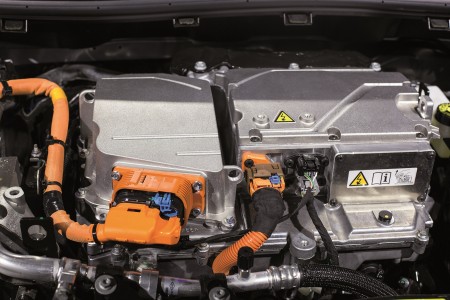Daily press, 2021-06-09, 08:15 am
Small component, big effect: bondal from thyssenkrupp significantly reduces noise in electric cars
bondal from thyssenkrupp Steel is a proven sandwich material for noise reduction in vehicle construction. The latest application tests with the innovative composite in electric vehicles also show its potential for optimizing the acoustics of electric motors and their power control units.
Small component, big effect
Electric motors are quieter than conventional combustion engines – another advantage for the environment and people, aside from their exhaust-free powertrain. However, electric powertrains generate noise inside the electric vehicle that people find particularly unpleasant. This can be eliminated by a relatively small component made of bondal, a sandwich material developed by thyssenkrupp Steel, which significantly reduces the noise emission of the so-called inverter. The inverter is a central component in every electric powertrain that converts direct current from the battery into alternating current for the motor and, depending on load condition, produces high-frequency sound emitted via the cover of the inverter housing. This unpleasant noise is a significant comfort issue that cannot be satisfactorily solved currently with conventional materials and without secondary acoustic measures. Components formed from bondal also offer, amongst others, air-borne sound damping properties and can thus minimize the unpleasant noise in electric cars. This effect is obtained through the special structure of bondal: the material is a steel-polymer-steel composite. Two steel sheets are bonded into a laminate under high contact pressure by a thin, adhesive polymer layer. This sandwich structure has a significant noise dampening effect. Compared to the solutions used today, this component made of bondal, with a weight of approx. 1.5 kg, can also be recycled easily.
bondal is particularly well suited for components which are excited to vibrate. Today, bondal is used, for example, in ship interior finishing, in the manufacture of glass containers, in rail vehicle construction and in the powertrain and carbody sectors in the automotive industry.
Strategic investments in e-mobility
bondal is just one example for the varied applications of steels for e-mobility. thyssenkrupp Steel has a holistic strategic approach to this topic: as part of its Strategy 20-30, the steelmaker is developing its plant on Essener Straße in Bochum into a center of excellence for e-mobility over the next few years. The capabilities in the field of the so-called non-grain oriented electrical steel are once again significantly strengthened by investments in plants, for instance, in a new double reversing mill and a new annealing and isolating line. This will make it possible to produce thinner and stronger grades, which are the basis for more powerful electric motors. These, in turn, are indispensable for the mobility transition to e-mobility.
The market for electric cars is growing. Today, there are already 70 models available on the German market; there are as many as 140 models when foreign manufacturers are also taken into account. Various studies predict that the share of electrically powered vehicles in Germany will go up to 40% by 2030.
Product information:
bondal® CPT
bondal® CB30
bondal® CB40
bondal® CL





